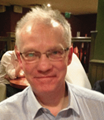The majority of people running Face Blind UK have prosopagnosia themselves, though we also very much value the input and support of researchers. The four current Directors of Face Blind UK are:
Jo Livingston

Jo was originally qualified as a chartered librarian and later worked as an IT lecturer – she’s now retired. She was actively involved in environmental campaigning for over twenty years, including three public inquiries.
Since 2006, when her face blindness was diagnosed, she’s been raising awareness of the condition through talks, first with special needs teachers throughout London and more recently through talks to U3As, WIs etc across south-east England. In 2012 Jo edited a book, ‘What It’s Like to be Face Blind’, a compilation of stories from around the world, and has also taken part in a variety of media interviews.
Hazel Plastow

Hazel’s work has always had a focus around equality of opportunity, particularly within the disability field. Initially working with children as a hospital play specialist and Portage home teacher, she moved into social research at Westminster Medical School, and then spent 25 years developing information management within the voluntary sector. She now works for Roundabout (the UK’s largest dramatherapy charity) and in 2023 qualified as a child psychotherapist.
Diagnosed with prosopagnosia in 2011, and recognising the need for information and support around face blindness, Hazel is now glad to have the opportunity to address this through the work of Face Blind UK.
Angela GoslingAngela Gosling

Angela is researcher in Cognitive Neuroscience with a particular interest in ‘Face Processing and Visual Perception and Cognition’. She is also a lecturer in Psychology at the University of East London and a member of the ‘Face Processing’ research group at that university. Previously, Angela worked as a post-doctoral researcher at Birkbeck College on an ESRC grant, investigating the functional characteristics and neural mechanisms associated with face processing in typical and atypical populations. Before that, Angela completed an ESRC funded PhD at Goldsmith College, University of London.
Her doctoral research employed behavioural and electrophysiological techniques (EEG/ERP) to investigate the role of spatial attention in visual object identification. Angela’s MSc thesis used EEG to explore how ‘paying’ attention to visual information in the environment influences what a person can ‘see’. Angela is currently using EEG/ERPs to explore face processing abilities in people with face blindness. Angela’s research aspirations include the development of realistic rehabilitative programs for people affected by face blindness.
Bob Cockshott

Bob became face blind on February 8th 2008 as a result of a stroke. Bob therefore understands how difficult it is for non-face blind people to appreciate the problems the condition causes, and is slowly learning the tricks prosopagnosics use to cope.
He has taken part in tests at four universities, and is delighted to be able to contribute to scientific understanding of the condition, and to raise awareness and help others through Face Blind UK.
Bob worked for many years on spacecraft technology, and is now employed in knowledge transfer making links between researchers, technology developers and users to benefit UK industry.
